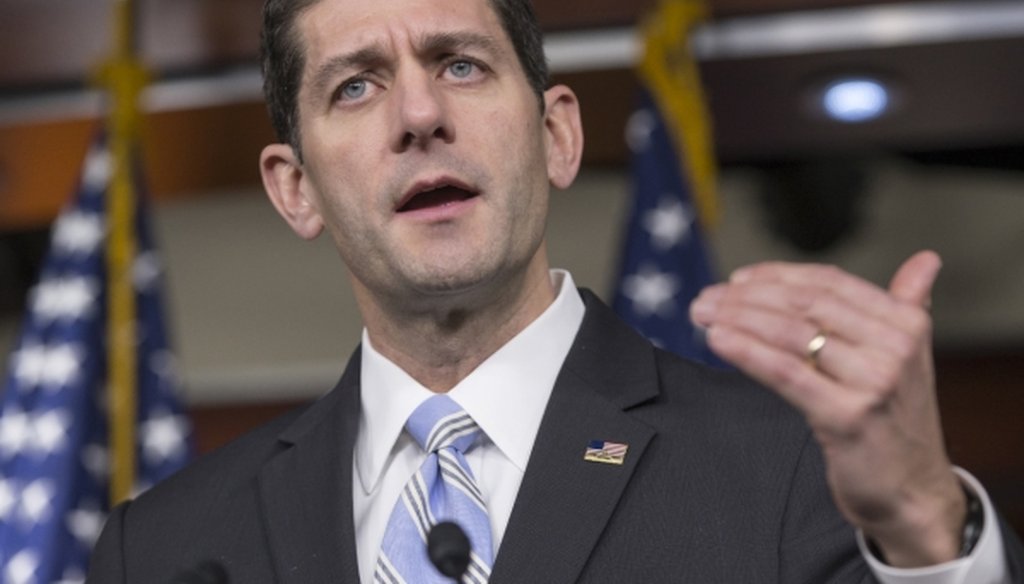Get PolitiFact in your inbox.

House Speaker Paul Ryan of Wisconsin talks to reporters on Capitol Hill on Jan. 7, 2016. (AP/J. Scott Applewhite)
Paul Ryan says 'if you were raised poor, you’re just as likely to stay poor' as 50 years ago
The newly installed House speaker, Rep. Paul Ryan, R-Wis., recently took to Medium to set the stage for a forum in Columbia, S.C., on Republican efforts to fight poverty. The forum, hosted by the Jack Kemp Foundation, drew six 2016 Republican presidential candidates – former Florida Gov. Jeb Bush, retired physician Ben Carson, New Jersey Gov. Chris Christie, former Arkansas Gov. Mike Huckabee, Ohio Gov. John Kasich and Florida Sen. Marco Rubio.
In his Medium column, Ryan wrote that a new direction was needed on government anti-poverty efforts.
"We’ve been fighting the War on Poverty for 50 years now," he wrote. "And I don’t think you can call it anything but a stalemate. The federal government has spent trillions of dollars. And yet today, if you were raised poor, you’re just as likely to stay poor as you were 50 years ago. I’m not saying we haven’t made progress. We have. But today we have a safety net that catches people falling into poverty. What we need is a safety net that lifts people out of poverty – that helps them earn a good paycheck so they can support themselves."
Here, we’ll check Ryan’s statement that "today, if you were raised poor, you’re just as likely to stay poor as you were 50 years ago."
When we asked Ryan’s staff for their evidence, they pointed us to an academic paper by Raj Chetty, Nathaniel Hendren, Patrick Kline, Emmanuel Saez and Nicholas Turner, "Is the United States Still a Land of Opportunity? Recent Trends in Intergenerational Mobility" from January 2014. Chetty and Hendren are at Harvard, Kline and Saez are at the University of California-Berkeley, and Turner was with the U.S. Treasury Department.
The paper, based on extensive analysis of income and educational-attainment data, found that "intergenerational mobility" has "remained extremely stable" since the generation of Americans born in 1971.
"We find that children entering the labor market today have the same chances of moving up in the income distribution (relative to their parents) as children born in the 1970s," the authors wrote.
Featured Fact-check
When we asked one of the co-authors, Saez, whether Ryan’s summary left out anything important, he said no.
"Yes, this is broadly correct," Saez told PolitiFact. Saez said the paper shows the odds of staying in the bottom one-fifth of the income distribution when your parents were in the bottom one-fifth have stayed stable for the past four to five decades.
The paper and Saez in the interview both noted one caveat – that the consequences of the pattern Ryan is citing have worse effects today because inequality has grown over the same period.
"Because inequality has risen," the paper notes, "the consequences of the ‘birth lottery’ – the parents to whom a child is born – are larger today than in the past."
However, this caveat doesn’t undermine Ryan’s point. If anything, it accentuates it. (We're also not penalizing Ryan for rounding up the study's length to 50 years.)
Tara Sinclair, a George Washington University economist and chief economist at the jobs site Indeed, said the paper Ryan chose is a credible one within the profession. "These are the authors I would turn to" when looking at intergenerational mobility.
Our ruling
Ryan wrote that "today, if you were raised poor, you’re just as likely to stay poor as you were 50 years ago." His support for this claim – a respected academic paper published in 2014 – found exactly what Ryan described. We rate the claim True.
Our Sources
Paul Ryan, "Expanding Opportunity — #KempForum16" (post on Medium), Jan. 9, 2016
Raj Chetty, Nathaniel Hendren, Patrick Kline, Emmanuel Saez, and Nicholas Turner, "Is the United States Still a Land of Opportunity? Recent Trends in Intergenerational Mobility," January 2014
WYFF4.com, "Several GOP candidates discuss poverty in SC," Jan. 10, 2016
Email interview with Tara Sinclair, George Washington University economist and chief economist at the jobs site Indeed, Jan. 19, 2016
Email interview with Emmanuel Saez, economist at the University of California-Berkeley and director of its Center for Equitable Growth, Jan. 19, 2016
Email interview with AshLee Strong, spokeswoman for Paul Ryan, Jan. 11, 2016
Browse the Truth-O-Meter
More by Louis Jacobson
Paul Ryan says 'if you were raised poor, you’re just as likely to stay poor' as 50 years ago
Support independent fact-checking.
Become a member!
In a world of wild talk and fake news, help us stand up for the facts.












































